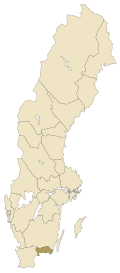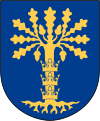Blekinge facts for kids
Quick facts for kids
Blekinge
|
||
|---|---|---|
|
||
 |
||
| Country | Sweden | |
| Land | Götaland | |
| County | Blekinge County | |
| Area | ||
| • Total | 2,900 km2 (1,100 sq mi) | |
| Population
(2009)
|
||
| • Total | 152,591 | |
| • Density | 52.6/km2 (136.3/sq mi) | |
| Ethnicity | ||
| • Language | Swedish | |
| Culture | ||
| • Flower | Oak and Mullein | |
| • Animal | Lucanus cervus | |
| • Bird | Nuthatch | |
| • Fish | Cod | |
| Time zone | UTC+1 (CET) | |
| • Summer (DST) | UTC+2 (CEST) | |
| Area codes | 0454–0457 | |
Blekinge is a special historical province located in the southern part of Sweden. It's often called "Sveriges trädgård," which means "the Garden of Sweden." This is because it has beautiful nature and many green areas. Blekinge is also famous for its amazing Blekinge archipelago, which is a group of islands and small rocky islets.
This area was once part of Denmark. However, in the 17th century, it became a part of Sweden. Today, Blekinge is home to over 150,000 people. It covers an area of about 2,900 square kilometers.
Contents
Discover Blekinge: Sweden's Garden Province
Blekinge is a unique place with a rich history and stunning natural beauty. It's a great spot to learn about Swedish culture and explore the outdoors. Let's dive into what makes this province so interesting.
Where is Blekinge?
Blekinge is located on the southeastern coast of Sweden. It's part of a larger region called Götaland. This province is also home to Blekinge County, which is a modern administrative area. The province has a long coastline along the Baltic Sea. This makes it a popular place for boating and enjoying the sea.
A Look at Blekinge's Past
The history of Blekinge is very interesting. For a long time, it was not part of Sweden. Its location made it important for trade and defense.
From Denmark to Sweden
Before the 17th century, Blekinge belonged to Denmark. There were many wars between Denmark and Sweden over the years. These conflicts often involved control over areas like Blekinge. Finally, in the 1600s, Blekinge became part of Sweden. This change was a big moment in the province's history. It shaped its culture and development.
Nature and Wildlife in Blekinge
Blekinge is known for its beautiful landscapes. It has forests, lakes, and a long coastline. This diverse environment supports many different kinds of plants and animals.
Blekinge's Special Plants and Animals
The province has its own special symbols from nature. The official flower of Blekinge is the Oak tree and the Mullein plant. Oak trees are strong and common in the area. Mullein plants have tall, yellow flowers.
For animals, Blekinge's official animal is the Lucanus cervus, also known as the stag beetle. This beetle is quite large and has impressive "antlers." The official bird is the Nuthatch. This small bird is known for climbing down tree trunks headfirst. And, as a coastal province, Blekinge's official fish is the Cod. Cod is an important fish in the Baltic Sea.
What Makes Blekinge Special?
Blekinge has several features that make it stand out. Its nickname, "the Garden of Sweden," tells you a lot about its character.
The Beautiful Blekinge Archipelago
One of the most famous parts of Blekinge is its archipelago. This is a chain of thousands of islands, islets, and skerries. Many people visit the archipelago for its natural beauty. You can go boating, kayaking, or simply relax by the water. The islands offer stunning views and a peaceful escape.
"The Garden of Sweden"
The nickname "Garden of Sweden" comes from Blekinge's fertile land and lush greenery. The province has many orchards and gardens. It's a place where nature thrives. This makes it a lovely area for outdoor activities and enjoying the fresh air.
 | Victor J. Glover |
 | Yvonne Cagle |
 | Jeanette Epps |
 | Bernard A. Harris Jr. |


